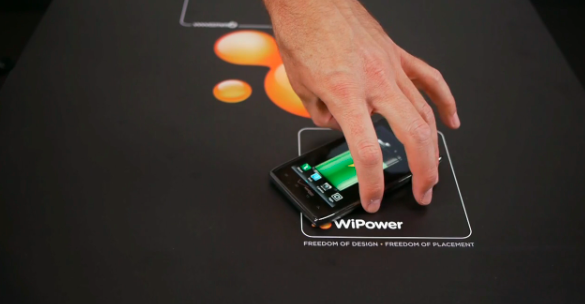If hauling around power chargers seems a practice that should be
relegated to the early 2000's, that's because it is: wireless charging
is here to stay,
but designers are still having difficulty navigating practical hurdles.
One of these hurdles is that wireless charging hasn't been compatible
with devices with metal exteriors, and that's a problem, especially
since so many manufacturers use metal alloys to increase durability in
their products.
But that problem is finally resolved: Qualcomm has just made itself the first company to enable wireless charging for devices with metal exteriors. The technology, Qualcomm® WiPower™, operates at a frequency that is more tolerant of metal objects, so cases and keys and coins won't affect charging capabilities, and devices don't have to make physical contact in order to charge. It looks like a small flat black mat that can be built into furniture, so that setting a device on a surface like a coffee table can actually charge its battery.

From a design standpoint, this is compelling, as now unsightly cables can be eliminated and users can operate their devices away from the mat while they charge. From a technical standpoint, however, the new technology opens up an entirely new array of compatability possibilities. The era of going completely wire-free may be upon us.
But that problem is finally resolved: Qualcomm has just made itself the first company to enable wireless charging for devices with metal exteriors. The technology, Qualcomm® WiPower™, operates at a frequency that is more tolerant of metal objects, so cases and keys and coins won't affect charging capabilities, and devices don't have to make physical contact in order to charge. It looks like a small flat black mat that can be built into furniture, so that setting a device on a surface like a coffee table can actually charge its battery.

The WiPower's black mat charging surface.
"QTIs engineering advancement eliminates a major obstacle facing wireless power and opens up the continued adoption of this desirable feature to a much wider range of consumer electronics and use cases."-- Steve Pazol, General Manager of Wireless Charging, Qualcomm IncorporatedWiPower™ utilizes Near Field Magnetic Resonance technology and other devices can be charged simultaneously, even if they have different power requirements. Devices can be stacked or even held away from the mat and still charged.
From a design standpoint, this is compelling, as now unsightly cables can be eliminated and users can operate their devices away from the mat while they charge. From a technical standpoint, however, the new technology opens up an entirely new array of compatability possibilities. The era of going completely wire-free may be upon us.







No comments:
Post a Comment